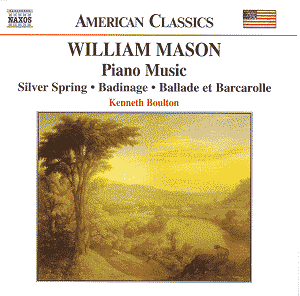William
Masonís father Lowell was a notable figure in American church
music and his nephew was Daniel Gregory Mason, both of whom have
eclipsed Williamís reputation. The trajectory of his career was
the expected one; early precocity cemented by studies in Leipzig,
Prague and Weimar and contact along the way with Moscheles and
Liszt. Tiring of life as a travelling virtuoso pianist he settled
instead for chamber music, teaching and composition. The violinist
in Masonís trio was Theodore Thomas and the trio gave, amongst
other novelties, the American premiere of Brahmsí Op.8. Gradually
though Masonís fame as a performer was supplanted by his pedagogic
material; his various books on technique had real currency.
Masonís
compositions reflect the barnstormer tradition exemplified by
such as Thalberg. They are poetic and winsome or showy and virtuosic,
something along the lines of William Wallaceís works. Some of
the later works reflect a more obviously poetic palette but the
Waltzes, Ballades and Improvisations all served their avowed purpose;
entertainment and enjoyment, purposeful vivacity rather than elevated
subtlety. Still thereís plenty merely to enjoy in that Thalberg-inspired
cornucopia of figuration and filigree, Silver Spring, through
the Chopin influenced Rêverie Poétique and on to
the dance rhythms (an especial Mason forte) of the wry Valse-Caprice.
Some of these do, itís true, lack development; the Mazurka-Caprice
is an example of a rather static imagination at work Ė but the
Lullaby is delightful and Caprice Grotesque, to which the notes
are too discreet to allude, is a tour de force variation on Twinkle
Twinkle Little Star. I enjoyed the nostalgia of the Three Preludes
even though the somewhat over resonant acoustic of The Sonic Temple
doesnít always work to their advantage, as I did the limpid if
sectional affection of Amourette.
The
salon pieces are well served by Kenneth Boulton who strikes the
right note between display and intimacy and heís joined by JoAnne
Barry in the four handed Badinage. Naxosí notes claim that the
later Mason resembled less his earlier influences and more Brahms
and Fauré but in truth his likeable and equable genre pieces
recorded here show little if any of this kind of influence. He
remained a miniaturist inspired by froth and sentiment and a likeable
one at that.
Jonathan
Woolf
see
also review by Don
Satz who strongly urges you to consider a disc that
just might be the perfect antidote to a stressful day; you can
even grab a
partner and dance till dawn.
